When it comes to vocalizations, dogs are known for their wide range of barks, yelps, and howls that can be music to our ears or signals of alarm. However, there is one breed that stands out for its intriguing and unique behavior in the realm of canine communication—the Akita. Renowned for its stoic nature and unwavering loyalty, the Akita has a reputation for being a breed that doesn’t bark as much as other dogs. But why is this the case?
Common Reasons for your Akita not barking are genetics, temperament, medical issues, anti-barking training, shyness, or just his general preference.
Originating from Japan, where they were bred as guardians and hunting companions, Akitas have developed a distinct set of traits that sets them apart from other breeds. Their calm and composed demeanor, combined with their strong protective instincts, contribute to their reputation as dignified and noble dogs. One of the intriguing aspects of their behavior is their minimal use of barking as a means of communication.
While it’s important to note that each Akita is an individual and may exhibit varying degrees of vocalization, it is generally observed that Akitas tend to be more reserved when it comes to barking. Instead, they rely on other forms of communication, such as body language, facial expressions, and even subtle vocalizations, to convey their emotions and intentions.
So, whether you’re an Akita enthusiast curious about their unique behavior or an Akita owner seeking to understand and navigate their breed’s vocal tendencies, this blog post will offer valuable insights. Prepare to unravel the mysteries behind the Akita’s silence and discover the fascinating world of canine communication that goes beyond barks and woofs.
5 Common Reasons Why Your Akita Doesn’t Bark
Here are some common reasons why your Akita may not bark a lot!
1) Breed (Genetics)
Barking is a breed-specific trait. Some breeds bark excessively while others barely bark!
Akita is one breed that only barks when it has to. Often, it barks to alert the owners of the intruders.
But if there are no threats to their owners, an Akita may not bark. Living in a safe environment means you will seldom hear your Akita’s voice!
Small dog breeds like the Chihuahua and Pomeranian are more vocal than the Akita.
Some dog breeds that don’t bark much are:
- Akita
- Golden Retriever
- Bloodhound
- Newfoundland
2) Every Dog is Unique
Just because a dog belongs to a certain barking or non-barking breed doesn’t mean that he will or won’t bark.
Every dog is different. Even within the same breed, there is much diversity displayed in terms of temperament and character.
Some Akita doesn’t bark at all while some may keep you up all night!
3) Medical Issues
Sometimes, a lack of Akita barking can be a result of physical or medical issues.
Strained vocal cords, throat infections, or general disease can reduce Akita barking.
If your Akita suddenly stops barking, he could be tired or not feeling well. If it persists, you should consider seeing a vet for advice.
Dogs that have had surgery or are recovering from illness might not bark much till completely in good health.
4) Prior Training
Have you adopted an adult shelter Akita and wondered ‘why doesn’t your Akita bark?
It might be because his previous owners have trained him not to bark.
With proper training, any dog can be made quieter. But for a dog that rarely barks like Akita, such training can make him invisible.
The prior owners could have used crude abusive methods to keep him from barking. There is no way to undo this but to shower him with love and care.
Hopefully, he will no longer feel afraid to bark and everything will return to normal!
5) Shyness
When adopting an Akita puppy, don’t expect him to start barking right away.
Small puppies are usually shy and require trust and bonding with their owners. Comfort is key to making him feel safe and secure.
A new Akita will probably take some time to inspect his new surroundings first. After he becomes familiar with every aspect of his new home, we are sure he will show off his voice to you.
Has the Akita Been Debarked?
If an Akita appears healthy and doesn’t bark, there could be another reason for this. Shelter dogs or dogs with previous owners show this issue.
Due to severe barking issues, the owners could have had the dog “debarked”.
The debarking procedure involves medical surgery to remove some tissue from the vocal cords. It results in a permanent reduction in barking volume.
This method of stopping Akita from barking is the last resort that should not be used. We do not recommend this to any dog whatsoever.

When Do Akita Bark?
Akitas are quiet dogs and only bark when they need to. That said, Akitas still bark when prompted to.
Akitas do come with many do’s and don’ts and certain actions can aggravate them. Aggravation is often accompanied by growling and barking.
Unhappy
Akitas that are unhappy will voice their concerns by barking and even moaning!
Many things could make your Akita unhappy, increasing the chances of him becoming ‘chatty”.
Wondering if Akita like attention, find out do Akita Like to Cuddle.
Do Akitas Like to Cuddle? Why Doesn’t my Akita Like to Cuddle?
Territorial Barking
Many Akita owners say their dog rarely barks indoors but barks a lot when outdoors.
Let us tell you why. Akita’s bark mostly when they are declaring their ownership over their territory.
When another dog or stranger comes near their territory, they use barking as a warning.
As a result, they expect the person or dog to back off. An Akita puppy might not display this barking pattern, but they will as they get older.
Alertness/Intruders
As with most dog breeds, an Akita will alert its owners if a person trespasses onto their property or home. Especially at night, Akitas are very effective guard dogs as they sound the alarm at burglars.
Akitas will gladly bark when such situations arise and may even turn to aggression. In most situations, excessive barking will be enough to chase away intruders.
Instances like this prove that Akita’s barking can be a form of defense for owners.
Having said that, be careful, Akita is also known not to bark while they attack an intruder!
Defense/Attack
Before a violent confrontation, an Akita could decide to voice his frustration. Agitated Akita barking is usually a warning sign that should be heeded!
After that it all becomes physical, a trait the Akita is renowned for.
Extreme barking can be a warning of an attack. read about common Reasons Why the Akitas Attack.
Do Akitas Howl? If So, Why?
Akitas can howl but not all of them choose to do so. An Akita can howl for one of the following reasons.
Injury
An injured Akita who is not receiving any medical attention might howl in an attempt to voice his pain.
Symptoms of Akita injury include limited mobility, long amounts of sleep, loss of appetite, etc.
If you notice any of these symptoms plus howling, take your Akita to a vet to stop their suffering.
Behavioral Issues
From the point, you adopt an Akita, training, and socializing are crucial.
Failure to create companionship with your Akita can lead him to be dominant! This dominant stance comes with many unwanted habits.
One such habit is howling, which mostly occurs at night. There are effective training methods to stop Akita from howling without being abusive or cruel towards your best friend!
Social Reasons
Howling is a tendency existing in wolves and is used as a communicative and social activity.
Dogs are related to wolves and once in a while may take to this ancestral trait. This is probably why when one dog howls many other dogs start to howl.
It sets off a chain reaction and is very common if your dog sleeps outside or on the porch.
To avoid Akita howling, allow him to sleep indoors and try to block out as much noise as possible.
So Your Akita Doesn’t Bark, What Should You Do?
What happens if your Akita doesn’t bark a lot? What action to take next depends on your answer to a question.
Did your dog use to bark a lot before?
If your answer is yes, the issue could be a physical one. A few sessions of heavy barking can take a toll on your Akita’s vocal cords. Perhaps this is the reason why he is not barking the past few days.
It is likely that your Akita has developed laryngitis. See if this condition persists for a few days. If not resolved, you must consult your vet. Your vet will conduct a physical examination of your Akita and try to resolve the issue.
This is the time to let your vet know when it started, along with any other symptoms you may have noticed.
During the examination, your vet may prescribe a blood test. Blood tests will reveal the RBC (Red Blood Cell) and WBC (White Blood Cell) counts. This would provide insights to determine the presence of an infection.
If blood tests don’t reveal much, the vet might conduct a urine test. His Calcium or Phosphate levels could provide a reason for throat-related infections.
An undiagnosed problem could even require an X-ray or bronchoscopy. If a lump is detected, a laryngoscopy is necessary to ascertain the diagnosis.
Your Akita will be put under anesthetic during this procedure. From here, the vet will prescribe medication or a medical procedure.
FAQs
No, Akitas are not excessive barkers.
In fact, the only time you get to hear their voice is when it is necessary. Certain situations will prompt your Akita to bark. Most of these instances occur when the Akita is outdoors.
Final Note
Akita is not known for barking.
While outdoors, an Akita might feel overprotective over his territory which causes him to bark.
While indoors, they should be quieter in a safe comfortable environment.
Though at times, neighborhood dogs, strangers, or intruders can make your Akita bark furiously.

